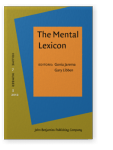Bailey, Lyam M., Kate Lockary & Eve Higby
2024.
Cross-linguistic influence in the bilingual lexicon: Evidence for ubiquitous facilitation and context-dependent interference effects on lexical processing.
Bilingualism: Language and Cognition 27:3
► pp. 495 ff.

Chaouch-Orozco, Adel & Fernando Martín-Villena
2024.
Network science reveals the early signs of L1 lexical attrition: Introducing the Lexical Attrition Foundation (LeAF) framework.
Bilingualism: Language and Cognition ► pp. 1 ff.

Casado, Alba, Jonas Walther, Agata Wolna, Jakub Szewczyk, Antonella Sorace & Zofia Wodniecka
2023.
Advantages of visiting your home country: how brief reimmersion in their native country impacts migrants’ native language access.
Bilingualism: Language and Cognition 26:5
► pp. 1026 ff.

Gharibi, Khadij, Fatih Bayram & Gustavo Guajardo
Lehtinen, Nana, Anna Kautto & Kati Renvall
2023.
Frequent native language use supports phonemic and semantic verbal fluency in L1 and L2: An extended analysis of verbal fluency task performance in an L1 language attrition population.
International Journal of Bilingualism 
Lehtinen, Nana, Anna Kautto & Kati Renvall
2024.
Efficacy of clustering and switching strategies in verbal fluency tasks in a Finnish-English language attrition population.
The Language Learning Journal 52:2
► pp. 218 ff.

Senar, Fernando, Elisabet Serrat, Judit Janés & Àngel Huguet
2023.
Heritage Language Instruction to Young Immigrants: An In-depth Look at the Psycholinguistic Effects During the Simultaneous Acquisition of Two Second Languages.
Applied Linguistics 44:4
► pp. 658 ff.

Felser, Claudia & Serkan Uygun
2022.
Optional Plural Agreement in Heritage Turkish Speakers’ Verb Form Choices.
Heritage Language Journal 19:1
► pp. 1 ff.

ALTIPARMAK, Ayşe
2021.
Eğitim Düzeyi Değişkeni Bağlamında ‘Gibi’ Söylem Belirleyicisinin Kullanımı.
Hacettepe Üniversitesi Edebiyat Fakültesi Dergisi 38:1
► pp. 272 ff.

Bermúdez-Margaretto, Beatriz, Federico Gallo, Mikhail Pokhoday, Yury Shtyrov, Hamutal Kreiner & Andriy Myachykov
2021.
Understanding Language Attrition through Orthography.
Languages 6:4
► pp. 199 ff.

Gallo, Federico, Beatriz Bermudez-Margaretto, Yury Shtyrov, Jubin Abutalebi, Hamutal Kreiner, Tamara Chitaya, Anna Petrova & Andriy Myachykov
2021.
First Language Attrition: What It Is, What It Isn’t, and What It Can Be.
Frontiers in Human Neuroscience 15

Gallo, Federico, Keerthi Ramanujan, Yury Shtyrov & Andriy Myachykov
2021.
Attriters and Bilinguals: What’s in a Name?.
Frontiers in Psychology 12

Istanbullu, Suat
2021.
language policy of trilingual transnational families living between Antioch, Paris and Berlin.
Sociolinguistic Studies 14:4

Ramonaitė, Jogilė Teresa & Meilutė Ramonienė
2021.
How, when and why can the mother-tongue language be forgotten? The case of international adoption.
Taikomoji kalbotyra 16
► pp. 1 ff.

Schmid, Monika S & Gülsen Yilmaz
2021.
Lexical Access in L1 Attrition—Competition versus Frequency: A Comparison of Turkish and Moroccan Attriters in the Netherlands.
Applied Linguistics 42:5
► pp. 878 ff.

Dorado Escribano, Guadalupe
2020.
Atrición lingüística, ¿término correcto para este “nuevo” fenómeno lingüístico?.
Pragmática Sociocultural / Sociocultural Pragmatics 8:2
► pp. 159 ff.

Schmid, Monika S. & Tuğba Karayayla
2020.
The Roles of Age, Attitude, and Use in First Language Development and Attrition of Turkish–English Bilinguals.
Language Learning 70:S1
► pp. 54 ff.

Tracy-Ventura, Nicole, Amanda Huensch & Rosamond Mitchell
2020.
Understanding the Long-Term Evolution of L2 Lexical Diversity: The Contribution of a Longitudinal Learner Corpus. In
Learner Corpus Research Meets Second Language Acquisition,
► pp. 148 ff.

Schmid, Monika S.
2019.
Language Attrition as a Problem for LADO. In
Language Analysis for the Determination of Origin [
Language Policy, 16],
► pp. 155 ff.

Schmid, Monika S. & Gülsen Yılmaz
2018.
Predictors of Language Dominance: An Integrated Analysis of First Language Attrition and Second Language Acquisition in Late Bilinguals.
Frontiers in Psychology 9

Gharibi, Khadijeh & Frank Boers
2017.
Influential factors in incomplete acquisition and attrition of young heritage speakers’ vocabulary knowledge.
Language Acquisition 24:1
► pp. 52 ff.

Gharibi, Khadijeh & Frank Boers
2019.
Influential factors in lexical richness of young heritage speakers’ family language: Iranians in New Zealand.
International Journal of Bilingualism 23:2
► pp. 381 ff.

Schmid, Monika S. & Barbara Köpke
Kasparian, Kristina & Karsten Steinhauer
2016.
Confusing similar words: ERP correlates of lexical-semantic processing in first language attrition and late second language acquisition.
Neuropsychologia 93
► pp. 200 ff.

Bergmann, Christopher, Simone A. Sprenger & Monika S. Schmid
2015.
The impact of language co-activation on L1 and L2 speech fluency.
Acta Psychologica 161
► pp. 25 ff.

Yılmaz, Gülsen & Monika S. Schmid
2015.
Second language development in a migrant context: Turkish community in the Netherlands.
International Journal of the Sociology of Language 2015:236

Yılmaz, Gülsen & Monika S. Schmid
SCHMID, MONIKA S. & SCOTT JARVIS
2014.
Lexical access and lexical diversity in first language attrition.
Bilingualism: Language and Cognition 17:4
► pp. 729 ff.

Schmid, Monika S., Barbara Köpke & Kees de Bot
2013.
Language attrition as a complex, non-linear development.
International Journal of Bilingualism 17:6
► pp. 675 ff.

This list is based on CrossRef data as of 8 july 2024. Please note that it may not be complete. Sources presented here have been supplied by the respective publishers.
Any errors therein should be reported to them.
